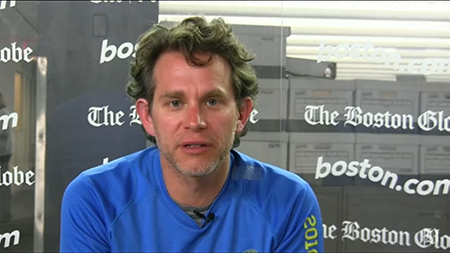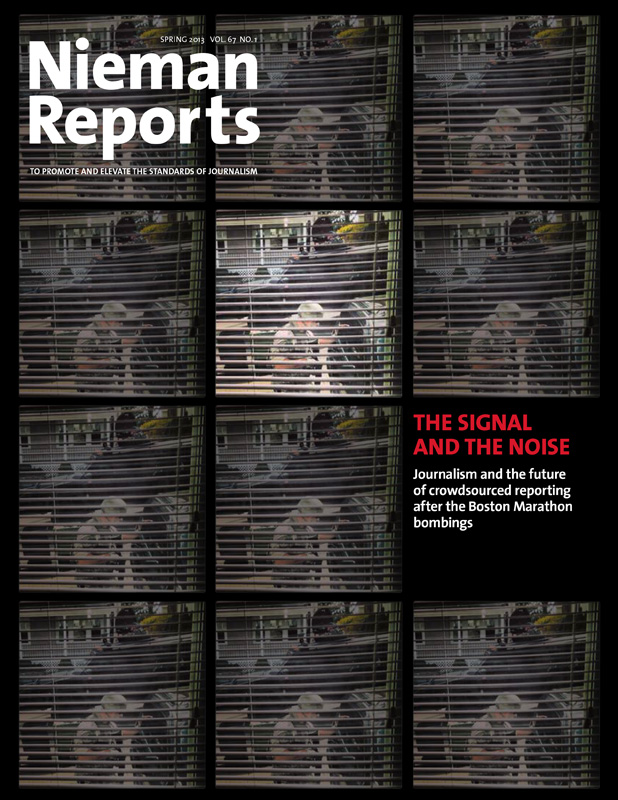
All of a sudden, I heard a massive boom. I felt the ground shake, and saw the plume of white smoke rising from the sidewalk. Then I heard the second explosion. My first instinct was to try to figure out what was happening. It only took a few seconds to realize that it was an attack. I saw all the carnage afterward, and I will have these memories seared into my brain. It was some of the worst things I've ever seen. I just picked up the camera and continued recording, to document what we were witnessing.
I haven't looked at the footage yet. Some it is on BostonGlobe.com, but I haven't watched the videos. It's probably pretty shaky. I'm not an experienced camera person, and I was definitely feeling the stress and fear.
I tried to interview as many people as I could, taking footage for as long as I could. The police started to clear people out after 15 minutes, and I was escorted toward the medical tent. I stayed there to interview some of the doctors and nurses who were treating the victims, and talked to people to get their accounts. Afterward I had to walk to my car, which was a mile or so away.
I was getting media requests from everywhere. I talked to Brian Williams on NBC, George Stephanopoulos on ABC, Good Morning America, Today. Calls were coming in from New Zealand, from Norway, from Russia. I think some of them found me through Twitter. I had sent a couple of tweets right away, just letting people know I was OK. I had also called my editor at the Globe right away and told him what I was witnessing. Together, another writer and I put together the first account that went online. We got that up right away, so I think quite a few people saw that.
Fine. Reporting. I was 10 feet from explosion. Shaken up. But not a scratch. Worst thing I ever saw.
— David Abel (@davabel) April 15, 2013So I was walking and talking to someone from the BBC when my phone died. I saw a man who was standing outside his house, and I asked him if he had a cell phone charger. He invited me inside, and while I was charging my phone I wrote my story on this stranger's living room couch. He was very nice, and he let me sit there for an hour and half.
I finally made it back to Globe, and worked with my editor to finish the story. It was kind of a surreal moment, because I hadn't been back in the newsroom in a year, and it was the first deadline story I'd written in a long time. All the while, every minute, someone was calling because they wanted to interview me. By the end of the night, I'd been on Piers Morgan, Anderson Cooper, and Rachel Maddow. It was a little insane. I had people calling me as late as 2 o'clock, and then again as early as 5 o'clock. I really didn't sleep, but not because the phone was buzzing.
I understand why. I can appreciate having been on the other side of having to ask these questions, and I had been asking the same things of other people all day. In fact, I'm hoping to write a story today about a father and daughter, both doctors, who were finishing the marathon just as the blasts hit. They both swung into action, and helped save lives. [That piece is now online at BostonGlobe.com.]
I remember I was on the corner of Boylston and Arlington street, a few blocks from the finish line. I was looking at the remains of the marathon, and it's kind of strangely frozen in time. It's a really haunting, eerie scene, like a marathon without a finish.
What makes the Boston Marathon such a unique, amazing experience is that you have better fans than anywhere else, and you have more fans than anywhere else. The crowds are intense and unbelievable. I speak as someone who's run the Boston Marathon three times. I ran it last year, in 100-degree heat. If it wasn't for the spectators, I never would have made it in. They watered me down and fed me along the way.
After it was over, I wrote a piece for the Globe, thanking the fans. I described finishing the Boston Marathon, when you cross onto Boylston Street. The roar of the crowd is deafening, people are packed onto the jersey barriers. You have all these people cheering for you, pulling for you. It's the sort of thing a mortal like me doesn't get to experience—it's like hitting a homerun at Fenway Park. You're like a rock star. One of the sad things is that I don't think the fan experience will ever be the same. I can't imagine it's going to be the same after this.
David Abel is a Boston Globe reporter and 2013 Nieman Fellow.
As told to Jonathan Seitz



